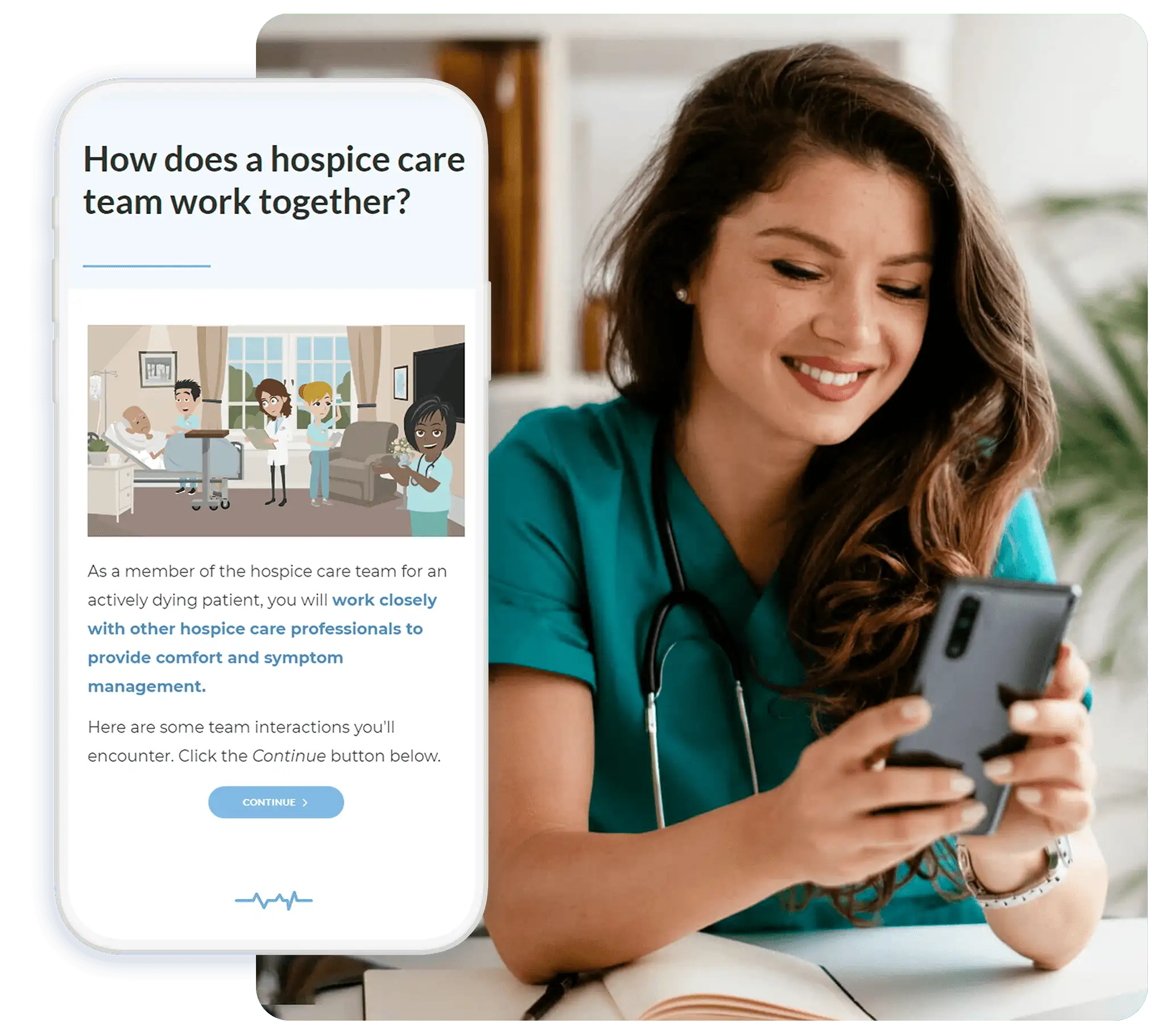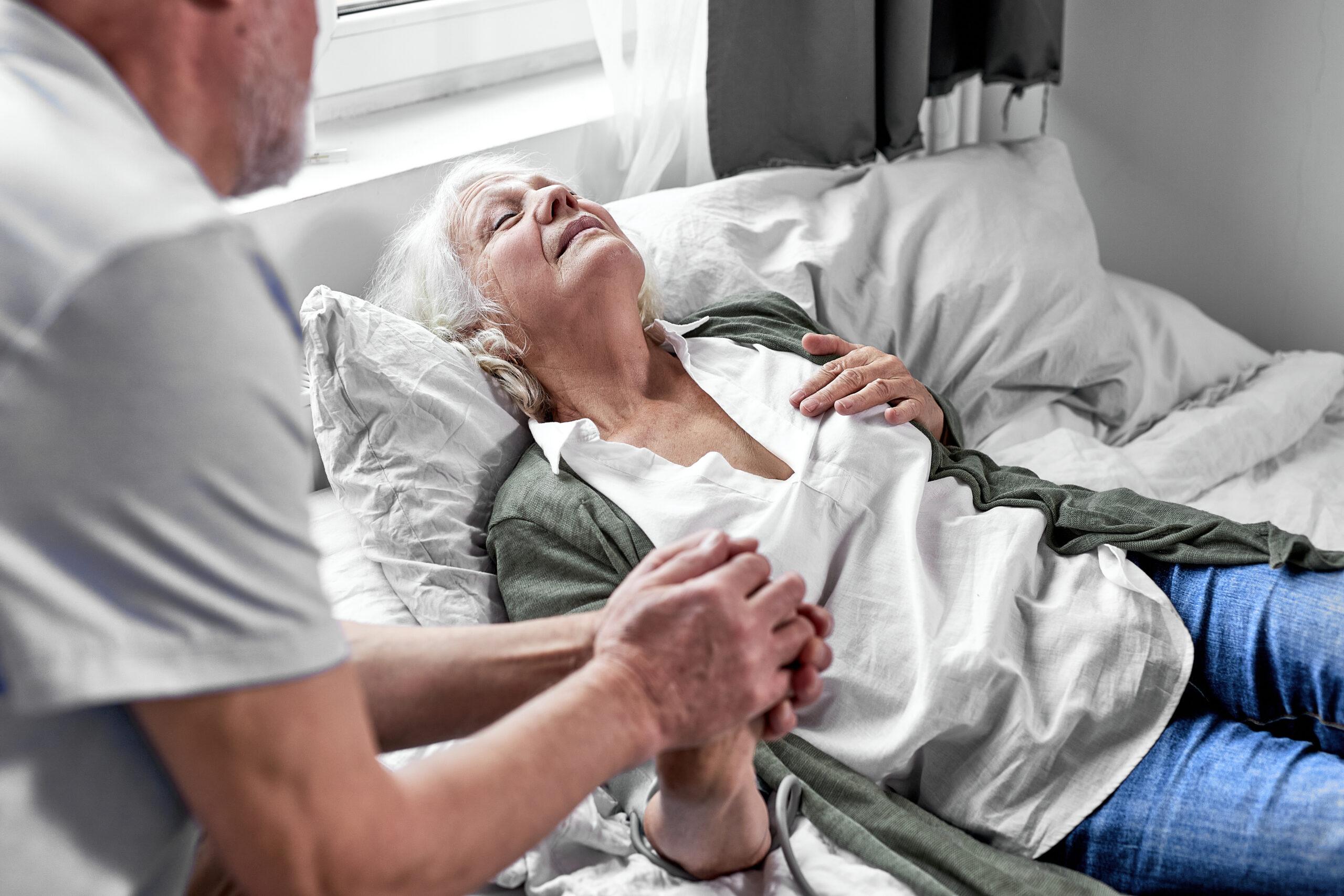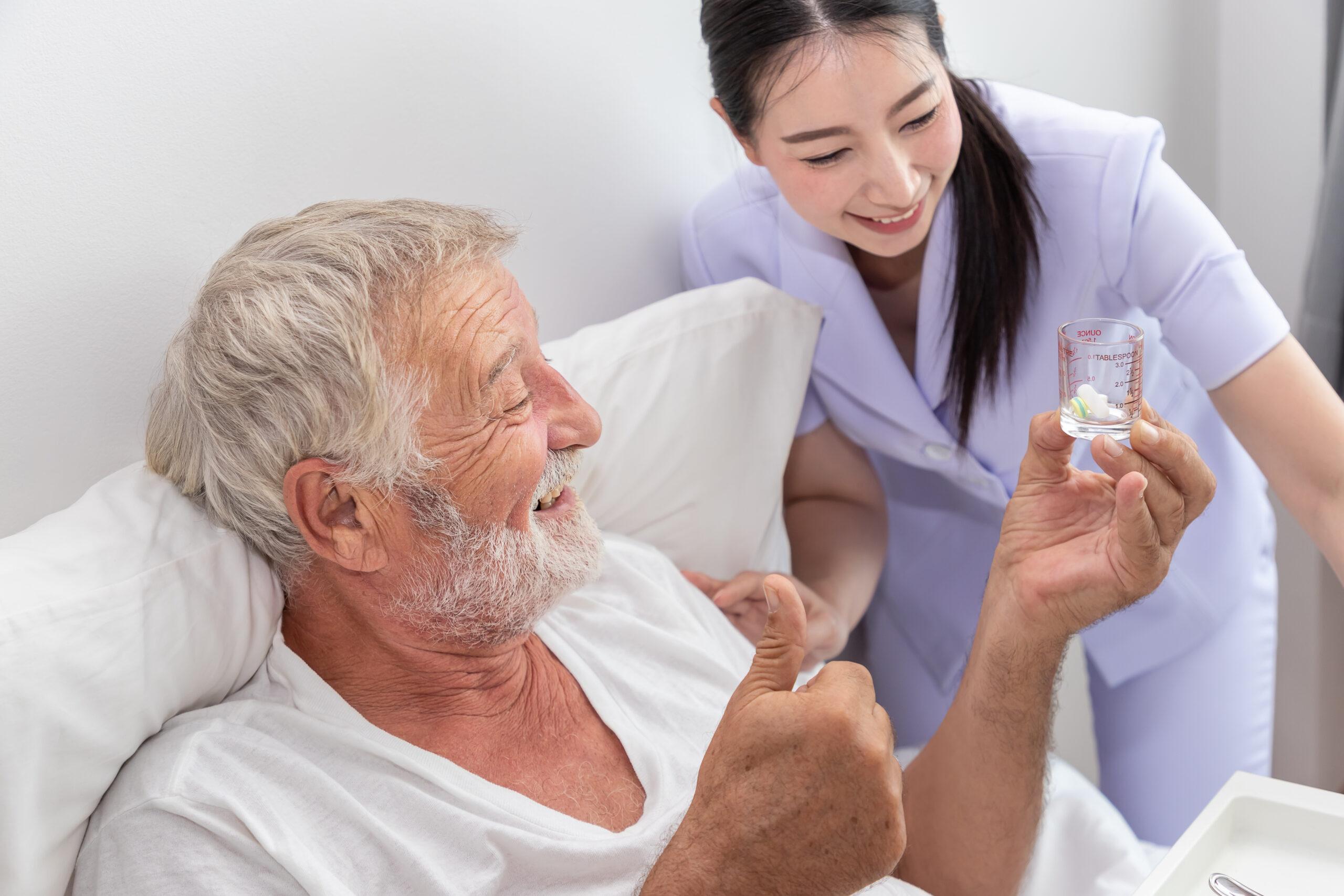Hospice Pain Management: A Comprehensive Guide
The aim of pain management in hospice is to enhance the quality of life for patients during end-of-life care. In realizing this aim, hospice nurses, caregivers, and managers have a crucial part to play.
This guide will discuss various aspects of pain management in hospice care, including signs and symptoms, evaluation and assessment, medications, emotional and spiritual support, complementary therapies, and common misconceptions about opioids.
This guide is packed full of info. Use the table of contents to skip to the info you’re looking for quickly.

Common Types of Pain in Hospice Patients
Effective hospice pain management involves a multidisciplinary approach that addresses the patient’s physical, emotional, and spiritual needs. It is essential to understand that pain is subjective and can manifest in various forms, such as nociceptive, neuropathic, or psychogenic pain. Timely assessment and appropriate interventions can significantly improve the patient’s comfort and quality of life.

CONTINUA LEARNING
Simplify Your Hospice Team’s Training and Skill Building
A complete solution for your agency: more than 125 hospice courses, caregiver in-services, training plans, and more.
Nociceptive Pain
Nociceptive pain is the body’s response to injury or inflammation, commonly experienced by hospice patients. It can be further classified into two subtypes:
- Somatic pain: Originates from bones, muscles, or connective tissues
- Examples: Arthritis, bone fractures, or muscle strain
- Visceral pain: Arises from internal organs
- Examples: Pancreatitis, liver metastases, or bowel obstruction
Treatment often includes NSAIDs, opioids, and physical therapy.
Neuropathic Pain
Neuropathic pain results from damage or dysfunction of the nervous system, characterized by burning or shooting sensations. Key aspects include:
- Causes: Diabetes, chemotherapy, nerve compression, or infections
- Common symptoms: Tingling, numbness, or hypersensitivity
Treatment options consist of anticonvulsants, antidepressants, and topical analgesics.
Psychogenic Pain
Psychogenic pain is a complex type of pain with psychological factors playing a significant role in its perception or exacerbation. Crucial elements are:
- Triggers: Stress, anxiety, or depression
- Manifestations: Unexplained pain or heightened sensitivity to pain
Effective management entails psychological support, counseling, and medications like antidepressants or anxiolytics.
Signs and Symptoms of Pain
Recognizing the signs and symptoms of pain in patients is crucial for effective hospice pain management. Some common pain indicators include:
- Verbal expressions: such as groaning, crying, or moaning
- Facial expressions: like grimacing, frowning, or clenching of teeth
- Behavioral changes: such as restlessness, agitation, or withdrawal
- Physiological signs: including increased heart rate, blood pressure, or sweating
Pain Assessment in Hospice Patients
Before beginning an initial hospice pain assessment, acknowledge the patient’s perception of pain, and the pain will be quickly addressed. Ensure the patient’s self-assessment of pain will be respected and utilized in creating the care plan.
First, perform a physical assessment to assist in identifying reversible causes of pain (e.g., constipation).
Physical Assessment
- General appearance: physical distress, functional level, body composition.
- Abdomen: assess for distention, ascites
- Edema: location, severity
- Skin: note any alterations in skin integrity, color and turgor
- Functionality: physical (ability to ambulate or not) and cognitive (mini-mental score)
- Nutritional status and hydration

Patient Interview
Use the following questions, step-by-step, during your interview to understand the patient’s plan and create a hospice pain management plan.
Reinforce patience and optimism. Realize that patients in severe pain often cannot tolerate a lengthy interview. Always use your best clinical judgment.
Remember that pain is subjective; therefore, the patient’s self-report should be the primary source of assessment. Hospice teams should reassure patients that most pain can be relieved safely and effectively. However, not all pain or associated symptoms can be eliminated.
Patient Interview: Where is the Pain?
- Which pain is the most severe or most bothersome?
- Ask patients to point to areas of pain on themselves, on you, or a drawing.
- Was there any event that may have precipitated the pain?
- Has the pain changed over time? Intensified, improved? (changed from being a dull ache to a sharp one) Remind patients that changes in pain do not necessarily mean the illness is worsening.
- How often does it occur?
- What things aggravate the pain?
- Is there anything that makes it feel better or hurt less?
- Is the pain better or worse at certain times of the day? For instance, pain that is worse in the morning may be musculoskeletal. Is there anything that relieves the pain?
Patient Interview: How would you describe the pain?
Often, describing pain is the most challenging portion of the assessment for many patients. Try to use open-ended questions. If the patient still has trouble, providing a list of descriptors such as the following may be helpful:
- Constant, intermittent
- Dull, aching
- Throbbing
- Squeezing, cramping
- Stabbing, shooting
- Sharp, searing
- Tingling, electrical
- Burning, pins and needles
What does the pain feel like?
- Have you ever had pain like this before? If so, what was the cause?
- What would you have to do to me to make me feel the pain that you are having? (stab, pinch, punch, twist, squeeze, etc.)
How intense is the pain?
Using a Numeric Rating Scale (NRS), ask your patient to report how much pain they are having by choosing a number from 0 (meaning no pain) to 10 (worst imaginable pain). The 0 to 10 NRS is the most commonly used of the rating scales.
If currently taking medication for pain, how well is it working?
- What medications or treatments for pain are you trying, or have you tried in the past?
- How is your current pain regimen working for you?
- How quickly does the medication take effect, and how long does it last?
- Do you have any side effects?
FLACC scale in Hospice
The FLACC scale is a valuable tool for assessing pain in hospice patients who have difficulty communicating their pain levels, such as those with cognitive impairments or who are non-verbal. FLACC stands for Face, Legs, Activity, Cry, and Consolability. It is an observational scale that helps caregivers, and hospice professionals evaluate pain by observing specific behavioral indicators.
Follow the table below to create a pain score for your patient.
| Category | Score: 0 | Score: 1 | Score: 2 |
|---|---|---|---|
| Face | Relaxed and neutral | Occasional grimace or frown | Frequent grimacing and frowning |
| Legs | Relaxed and neutral | Uneasy, restless, or tense | Kicking or legs drawn up |
| Activity | Lying quietly, normal position | Squirming, shifting, or guarding a painful area | Arched, rigid, or jerking body |
| Cry | No cry or moans | Occasional complaint or moan | Continuous crying or screaming |
| Consolability | Easily consolable | Reassurance or distraction provides relief | Difficult to console or comfort |
Add the scores from each category to obtain a total FLACC score ranging from 0 (no pain) to 10 (severe pain). This score can guide the care team in adjusting the patient’s hospice pain management plan. Regularly reassessing the patient using the FLACC scale helps ensure their pain is effectively managed, and their comfort is maintained throughout their hospice care journey.
By completing this pain assessment interview, you will gain a clear understanding and be ready to create a care plan and medication schedule.

Pain Medications for Hospice Pain Management
Effectively managing pain in hospice care involves a combination of medications tailored to the patient’s specific needs. The choice of medication depends on the type of pain, the patient’s history, and the severity of the pain. Commonly used pain medications in hospice care are:
- Non-opioids: Over-the-counter drugs like acetaminophen (Tylenol) and nonsteroidal anti-inflammatory drugs (NSAIDs) such as ibuprofen (Advil, Motrin) or naproxen (Aleve) should be considered for mild to moderate pain. These medications also help reduce inflammation and alleviate pain.
- Opioids: For moderate to severe pain, opioids like morphine, hydromorphone (Dilaudid), oxycodone (OxyContin), and fentanyl (Duragesic). These medications are more potent than non-opioids and may be combined with non-opioids for optimal pain relief. Opioids can cause side effects such as constipation, drowsiness, and nausea, which must be monitored and managed.
- Adjuvant medications: These may not have been designed initially to treat pain but can provide relief alongside primary pain medications. Examples include antidepressants, anticonvulsants, corticosteroids, and muscle relaxants. They can help manage specific types of pain like nerve pain, bone pain, or muscle spasms.
- Topical medications: In some cases, topical treatments such as creams, gels, or patches can be used for localized pain relief. These medications can be applied directly to the skin to provide comfort without causing systemic side effects.
- Breakthrough pain medications: Fast-acting opioids like immediate-release morphine or fentanyl manage sudden, severe pain that “breaks through” the patient’s regular pain control. They provide quick relief.
Monitor and adjust the patient’s medication regimen to ensure optimal pain control while minimizing side effects. Effective pain management requires ongoing communication and collaboration between the patient, caregivers, and the hospice care team.

Misconceptions About Opioids in Hospice
Misconceptions are common with opioid use in hospice care. These include:
- Opioids are always addictive: While opioids have the potential for addiction, the risk is significantly lower in hospice patients when used appropriately for pain management.
- Opioids hasten death: Research shows that appropriate opioid use for pain relief does not shorten life expectancy in hospice patients.
- High doses of opioids cause significant side effects: Most side effects, such as nausea or constipation, can be managed effectively with appropriate interventions and monitoring.
Emotional and Spiritual Support in Hospice Pain Management
In hospice care, addressing pain management’s emotional and spiritual aspects is essential for a comprehensive approach to end-of-life care.
- Active Listening: Hospice caregivers should listen empathetically to patients and families, fostering trust and open communication about pain and emotions.
- Emotional Counseling: Counseling from trained professionals can help patients and families navigate emotional challenges during end-of-life care.
- Spiritual Support: Tailored spiritual support, including guidance from chaplains or spiritual advisors, can provide comfort based on the patient’s beliefs.
- Mindfulness Techniques: Teaching patients deep breathing, meditation, or guided imagery can empower them to manage pain and emotional distress.
- Creative Outlets: Encouraging art, music, or journaling can help patients process feelings and find meaning in their experiences.
- Family Involvement: Including family members in emotional and spiritual care can offer additional support and improve communication.
- Bereavement Support: Hospice care also provides grief counseling and support groups for families after a patient’s passing.
Integrating emotional and spiritual support in hospice pain management creates a compassionate approach to end-of-life care, bringing peace and comfort to patients and families.

Complementary Therapies for Hospice Pain Management
Complementary therapies can enhance conventional hospice pain management in hospice care by addressing physical discomfort, emotional distress, and spiritual suffering. Here are some popular complementary therapies:
- Massage therapy: Promotes relaxation, relieves muscle tension, and reduces anxiety. Techniques can be tailored to the patient’s unique needs.
- Acupuncture or acupressure: Involves stimulating specific points on the body to balance energy flow and promote natural healing. Both techniques can provide pain relief and stress reduction.
- Aromatherapy: Uses essential oils to evoke emotional responses and promote well-being. Consider potential allergies or sensitivities before use.
- Guided imagery or meditation: Helps patients cope with pain and stress by focusing on calming images or thoughts, inducing deep relaxation.
- Music therapy: Reduces pain, anxiety, and depression through listening to calming music, playing instruments, or engaging in guided relaxation exercises.
- Pet therapy: Involves visits from trained therapy animals to provide companionship, emotional support, and comfort.
- Reiki: A form of energy healing that facilitates the flow of healing energy, reducing pain, anxiety, and stress while promoting relaxation.
Consult with the patient’s healthcare team before using complementary therapies. Integrating these therapies with conventional pain management approaches can create a comprehensive, holistic care plan addressing physical, emotional, and spiritual needs.
Conclusion
Effective hospice pain management is integral, as it significantly impacts the patient’s quality of life and comfort. Consider hospice training online for your staff to improve identifying symptoms of pain, assessing pain accurately, utilizing appropriate medications and interventions, and addressing emotional and spiritual needs.
FAQs: Pain Management in Hospice Care
What pain meds do they use in Hospice?
Hospice care providers use a range of pain medications, including opioids (morphine, hydromorphone, oxycodone), non-opioid analgesics (acetaminophen, NSAIDs), and adjuvant medications (antidepressants, anticonvulsants, corticosteroids).
What pain medication is given at the end of life?
Potent opioids, such as morphine or hydromorphone, are commonly used to manage pain at the end of life due to their effectiveness and ease of titration.
Does Hospice focus on pain management?
Pain management is a primary focus of hospice care, as it significantly impacts the patient’s quality of life and comfort.
How is pain managed at the end of life?
Pain at the end of life is managed using a combination of pharmacological interventions (opioids, non-opioid analgesics, adjuvant medications) and non-pharmacological approaches (emotional and spiritual support, complementary therapies).
What is the opioid of choice for pain relief at the end of life?
Morphine is often considered the opioid of choice for pain relief at the end of life due to its efficacy, availability, and ease of titration.
What hospice medication is stronger than morphine?
Hydromorphone and fentanyl are opioids that are more potent than morphine and may be used in certain situations for pain management in hospice care.
